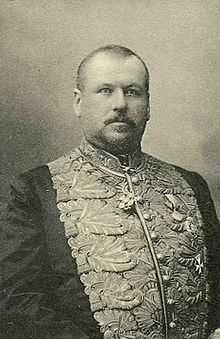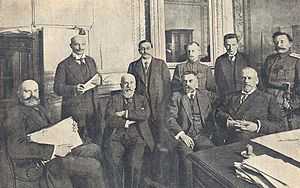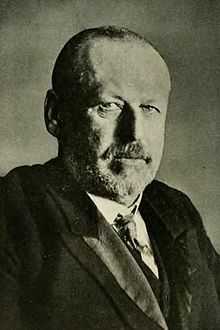Mikhail Rodzianko

Mikhail Vladimirovich Rodzianko (Russian: Михаи́л Влади́мирович Родзя́нко; Ukrainian: Михайло Володимирович Родзянко) (February 21, 1859, Yekaterinoslav Governorate – January 24, 1924, Beodra, Kingdom of Yugoslavia) was a Russian politician, State Councillor and chamberlain of the Imperial family, Chairman of the State Duma and one of the leaders of the February Revolution of 1917, during which headed the Provisional Committee of the State Duma. He was a key figure in the events that led to the abdication of Nicholas II of Russia on 15 March 1917.
Life
Rodzianko was born in Popasnaya. He came from an old and rich Ukrainian noble family and was educated at the Corps des Pages. From 1877 until 1882 he served in the Her Majesty's Regiment of the Cavalry of the Guard, and served as Kammerherr of Alexander II of Russia during one year. In 1884 Rodzianko married Anna Nikolaevna Galitzine (1859-1929); the couple had three children. From 1903 until 1905 he was editor of a newspaper, called "Herald Katerynoslav zemstvos."[1] In 1906 he was elected in the First Duma.[2] Besides was appointed as Marshall of the Gentry and for the Zemstvo as Provincial Zemstvo Executive (1906).[3]
Rodzianko, with Guchkov, was one of the founders and leaders of the Octobrist party. He became a deputy in the Third Duma (1907), vice-president in 1909 and was elected Chairman after the resignation of Aleksandr Guchkov in 1911, who was hated by the court as a “Young Turk.”[4] He then continued as the Chairman of the Fourth Duma from 1912 until its dissolution in February 1917.
Chairman of the Fourth Duma

As a supporter of constitutional monarchy in the English style, Rodzianko was connected with Russian opposition circles that during the First World War fought against Rasputin and prepared a "revolution from above".
The government had isolated itself from all the political parties when Rodzianko took action. He became the head of Military-Industrial Committee, an organization created by industrial magnates in order to supply the army. (The changes for the Russian Army on the Eastern Front improved in 1916.)
Rodzianko was a monarchist and thought after the meeting between Grigory Rasputin and tsar Nicholas II: "It marked the beginning of the decay of the Russian society and the loss of prestige of the throne and of the tsar himself." Rodzianko gathered information on Rasputin and handed it over to Tsar. Rodzianko, who requested Rasputin to leave the capital,[5] and Theofan of Poltava held Rasputin for a Khlyst.[6] "The emperor took no account of the report which nevertheless proved undoubtedly that Rasputin was not the holy man he claimed to be. Rasputin considered Rodzianko a personal enemy." On 21 February 1913 Rodzianko dismissed Rasputin from the Cathedral of Our Lady of Kazan shortly before the celebration of 300 years rule of the Romanov's over Russia. He had established himself in front of the seats which Rodzianko, after great difficulty, had secured for the Duma. According to Orlando Figes "... the members were to be seated at the back, far behind the places reserved for the state councillors and senators. This, he complained to the master of ceremonies, was 'not in accordance with the dignity' of the parliament.[7]

"Rodzianko told the Tsar in March 1913: 'A war will be joyfully welcomed and it will raise the government's prestige.'"[8] In April 1915 Rodzyanko traveled to the Russian troops, which occupied Austrian Galicia.
On August 11, 1915, the day the Tsar announced he would take the Supreme Command from Grand Duke Nicholas, Rodzianko suffered a heart attack.[9] Rodzianko was taken to Nauheim, where he was treated. Somehow Rodzianko participated in the creation of the Progressive Bloc.[10]
In Summer 1916 there was another crisis in the government: Alexander Protopopov was proposed by Rodzianko to the Tsar and Protopopov hinted at Rodzianko as Premier and Foreign Minister. Rodzianko demanded the exile of the Empress in the Crimea until the end of the war. The Tsarina demanded that Rodzianko's Court rank should be taken from him.[11] She referred to him in her letters as a scoundrel.[12]
Rodzianko, Zinaida Yusupova, Alexandra's sister Elisabeth, Grand Duchess Victoria and the Tsar's mother tried to influence the Emperor or his stubborn wife [13] to remove Rasputin, but without success.[14]
Russian February Revolution

Mikhail Rodzianko was one of the key politicians during the Russian February Revolution. On 26 February Rodzianko urged the Tsar to promulgate reforms in a telegram.[15] "Serious situation in the capital, where anarchy reigns. General discontent increasing. In the streets, uninterrupted firing, and one part of the troops is firing on the other. It is necessary to nominate without delay a person possessing the confidence of the people and who would form a new Government. To wait is impossible."[16] Nicholas refused to reply, and in a conversation with Count Vladimir Freedericksz referred to him, not very respectfully, as "fat Rodzianko".[17] On the 27th of February he presided over the Provisional Committee of the State Duma, and retired as Captain of the Guards. Then Rodzianko led abdication talks with Tsar, to satisfy the crowds. On 1 March 1917 Rodzianko assured general Mikhail Alekseyev that the Duma leaders, rather than the Soviet ones, would form the new government in Petrograd. The Tsar had no other choice than to follow Rodzianko's advice. On the 3 March (Old Style) or 15 March (New Style) the Tsar stepped down in favor of his son Alexei. As the tsesarevich suffered from an incurable disease, hemophilia B his life expectations were short.[18] Then Grand Duke Michael Alexandrovich of Russia came into the picture.
With Prince Lvov, Alexander Kerensky and Pavel Miliukov Rodzianko visited Grand Duke Michael, the new heir to the throne. The Grand Duke declined the crown after a long talk with Rodzianko.[19] The power came fully in the hands of the Russian Provisional Government and the Petrograd Soviet.
Rodzianko remained prime minister just for a few days. On March 15, 1917 a Provisional Government was formed, which included members of the Social Revolutionary Party. To them Rodzianko was totally unacceptable as prime minister and Prince Georgi Lvov, a member of the Constitutional Democratic Party, became his successor.
Later years
In 1918, shortly after the seizure of power by Lenin, he left Moscow and moved to the Crimea. Rodzianko supported Anton Denikin and Pyotr Wrangel but when it became clear the White Army had lost he emigrated to Serbia in 1920. There he wrote his memoirs The Reign of Rasputin, first published in 1928. According to Bernard Pares he died in great poverty.[20] His remains were moved to the new cemetery in Belgrade.
- "M. Rodzianko was an exceptionally tall and powerful man".[21] When Rodzianko met Tsarevich Alexei for the first time, he introduced himself as "the fattest man in Russia".[22]
- Rodzianko was a pious man, an expert on hymns, and had an sonorous voice, bass.[23]
- Until his death Rodzianko was attacked by Russian Monarchists, who held him responsible for the overthrow of the tsarist regime.[24]
- His nephew was Alexander Rodzyanko who played an important role in the White Army during the Russian Civil War.
- Rodzianko was friendly with George Buchanan, the British Ambassador in Saint Petersburg.
References
- ↑ Leon Trotsky (1932) The History of the Russian Revolution. Volume One: The Overthrow of Tzarism.
- ↑ Out of My Past: Memoirs of Count Kokovtsov
- ↑ Bernard Pares' introduction to Rodzianko (1927), at p.v.
- ↑ Leon Trotsky (1932) The History of the Russian Revolution. Volume One: The Overthrow of Tzarism.
- ↑ G. King (1994) The Last Empress. The Life & Times of Alexandra Feodorovna, tsarina of Russia, p. 188; B. Moynahan (1997) Rasputin. The saint who sinned, p. 168; A. Spiridovich (1935) Raspoutine (1863-1916), p. 286; J.T. Fuhrmann (2013) Rasputin, the untold story, p. 92.
- ↑ E. Radzinsky (2000) Rasputin: The Last Word, p. 230.
- ↑ O. Figes (1996) A People's Tragedy: The Russian Revolution, 1891–1924, p. 9.
- ↑ O. Figes (1996) A People's Tragedy: The Russian Revolution, 1891–1924, p. 248.
- ↑ Margarita Nelipa (2010) The Murder of Grigorii Rasputin. A Conspiracy That Brought Down the Russian Empire, p. 95. Gilbert's Books. ISBN 978-0-9865310-1-9.
- ↑ Leon Trotsky (1932) The History of the Russian Revolution. Volume One: The Overthrow of Tzarism.
- ↑ B. Pares (1939), "The Fall of the Russian Monarchy", p. 381, 395.
- ↑ Leon Trotsky (1932) The History of the Russian Revolution. Volume One: The Overthrow of Tzarism.
- ↑ The Real Tsaritsa by Madame Lili Dehn
- ↑ The Russian Provisional Government, 1917: Documents, Volume 1, p. 18 by Robert Paul Browder, Aleksandr Fyodorovich Kerensky
- ↑ http://www.alexanderpalace.org/letters/february17.html
- ↑ Through the Russian Revolution : Notes of an Eye -Witness, from 12th March 30th May.
- ↑ The Russian Revolution: A Beginner's Guide By Abraham AscherThe Russian Provisional Government, 1917: Documents, Volume 1. Edited by Robert Paul Browder, Aleksandr Fyodorovich Kerensky
- ↑ http://www.alexanderpalace.org/letters/february17.html
- ↑ O. Figes (1996) A People's Tragedy: The Russian Revolution, 1891–1924, p. 341-342, 345.
- ↑ Bernard Pares' introduction to Rodzianko (1927), at p.viii.
- ↑ Explanatory footnote at Rodzianko (1927), p. 51, supplied by the Russian-to-English translator Catherine Zvegintzoff.
- ↑ Leon Trotsky: The History of the Russian Revolution (1.10 The New Power)
- ↑ Leon Trotsky (1932) The History of the Russian Revolution. Volume One: The Overthrow of Tzarism.
- ↑ Leon Trotsky (1932) The History of the Russian Revolution. Volume One: The Overthrow of Tzarism.]
Sources
- Figes, O. (1996) A People's Tragedy: the Russian Revolution, 1891–1924.
- Rodzianko, M. V. (1927) The Reign of Rasputin: an empire's collapse: Memoirs of M. V. Rodzianko, A. M. Philpot, (London).
![]() Media related to Mikhail Rodzianko at Wikimedia Commons
Media related to Mikhail Rodzianko at Wikimedia Commons
| Preceded by Aleksandr Guchkov |
Chairman of the State Duma 22 March 1911 — 6 October 1917 |
Succeeded by None |
|